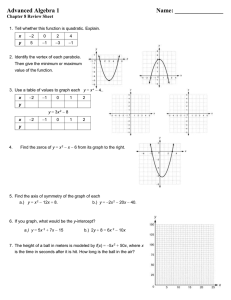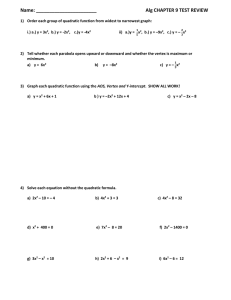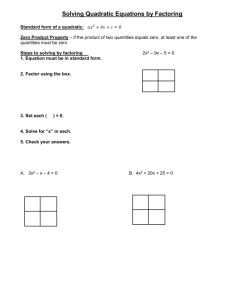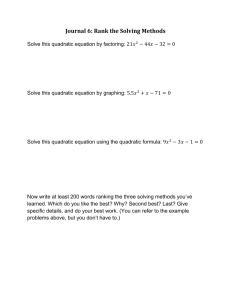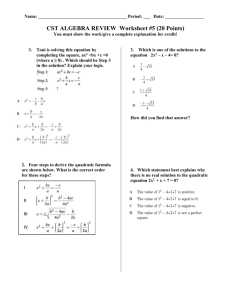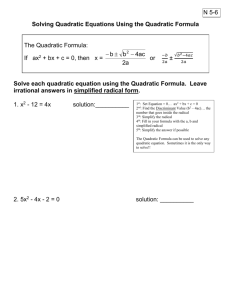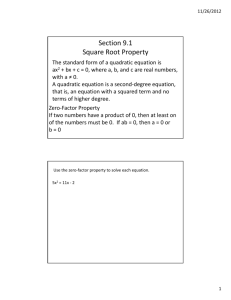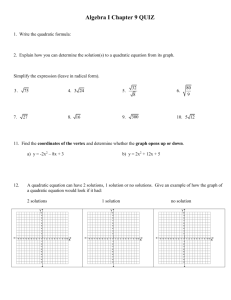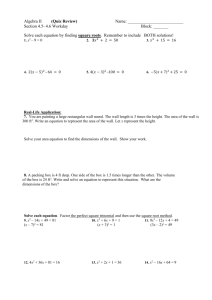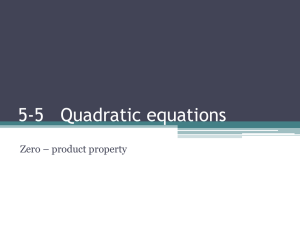1) 2) 3) 4 - TeacherWeb
advertisement
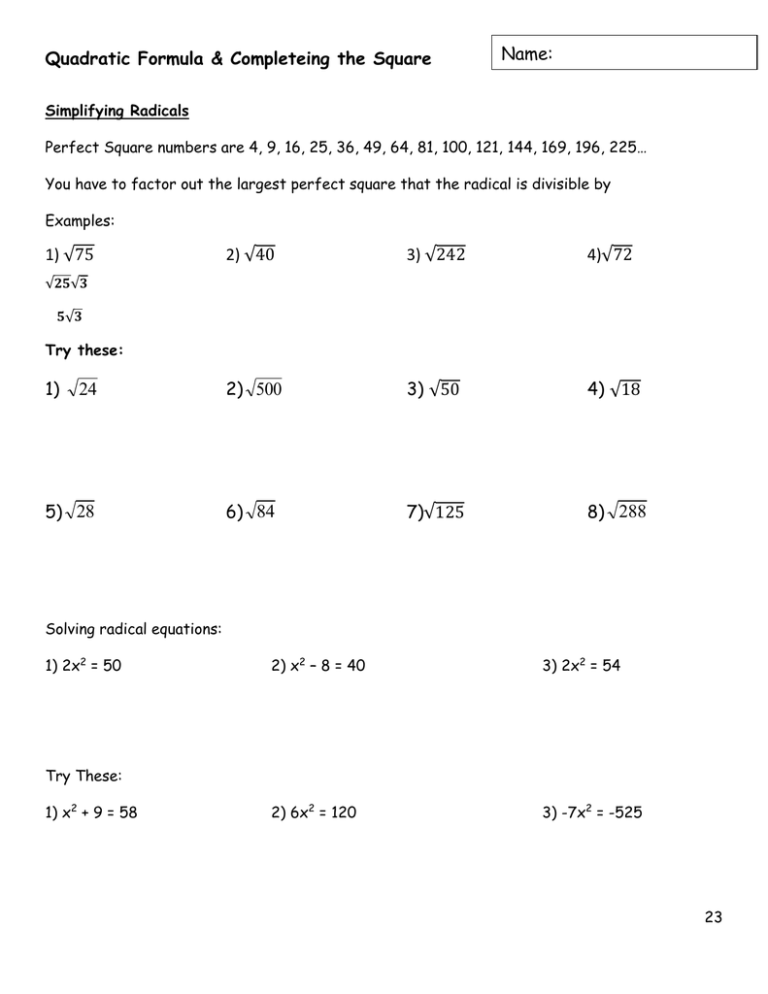
Quadratic Formula & Completeing the Square Name: _____________________ Simplifying Radicals Perfect Square numbers are 4, 9, 16, 25, 36, 49, 64, 81, 100, 121, 144, 169, 196, 225… You have to factor out the largest perfect square that the radical is divisible by Examples: 1) √75 2) √40 3) √242 4)√72 2) 500 3) √50 4) √18 6) 84 7)√125 8) 288 √𝟐𝟓√𝟑 𝟓√𝟑 Try these: 1) 24 5) 28 Solving radical equations: 1) 2x2 = 50 2) x2 – 8 = 40 3) 2x2 = 54 2) 6x2 = 120 3) -7x2 = -525 Try These: 1) x2 + 9 = 58 23 Simplifying Complex Radicals: 1) What number times itself equals 9? ___ 2) What number times itself equals -9? ___ We call square roots of negative numbers complex radicals. Since we know the √9 = 3, then we can use “imaginary numbers” to find that √−9 equals 3i Examples: 1) √−25 2) √−121 3) √−44 4) √−45 9) √−128 10) √−242 11) √−81 Try these: 8) √−32 Solving radical equations: 𝑥2 = -16 1) -2p2= 250 2) 4) -7m2 = 49 5) x2 – 9 = -37 3 3) y2 + 10 = -26 6) r2 = -121 24 Practice with simplifying: Simplifying with perfect squares: 6 ±√144 1) 2 2) −3 ±√289 5 3) 5 ±√81 2 4) 10 ±√625 5 Simplify the following square roots: 5) √20 6) √125 7) √392 8) √48 Simplifying with square roots that can be simplified: 9) 2 ±√20 13) 6 3 ±√18 6 10) 14) 20 ±√125 10 30 ±√200 10 11) 15) 21 ±√392 14 21 ±√45 24 12) 16) 12 ±√48 4 20 ±√75 5 25 The Quadratic Formula A quadratic function is standard form is written __________________. The highest power in a quadratic function is _____. The quadratic formula: 𝒙= −𝒃 ∓ √𝒃𝟐 −𝟒𝒂𝒄 𝟐𝒂 ** Can be used to factor quadratic functions ** Rules: 1) Make sure the equation is set equal to zero 2) Identify “a”, “b”, and “c” 3) Plug numbers into the quadratic formula 4) Simplify Examples: 1) x2 + 3x – 4 = 0 2) 9x2 – 6x – 11 = 0 a = _____ b = ______ c = _____ a = _____ b = ______ c = _____ x= −𝑏 ± √𝑏 2 −4𝑎𝑐 2𝑎 = x= 3) 2a2 − a − 15 = 0 4) 4x2 + 11x – 20 = 0 a = _____ b = ______ c = _____ a = _____ b = ______ c = _____ x= x= 5) x2 – 3x – 3 = 0 6) x2 + 5x + 5 = 0 a = _____ b = ______ c = _____ a = _____ b = ______ c = _____ x= x= 26 Solve for ax2 + bx + c = 0, then factor using the quadratic formula: 𝒙= −𝒃 ∓ √𝒃𝟐 − 𝟒𝒂𝒄 𝟐𝒂 1) 4x2 – 1 = -8x 2) 4x2 + 7x = 15 a = _____ b = ______ c = _____ a = _____ b = ______ c = _____ x= x= 3) 2x2 + 23 = 14x 4) 2x2 + 39 = -18x a = _____ b = ______ c = _____ a = _____ b = ______ c = _____ x= x= 5) 5x2 + 3x = -1 6) 5x2 + 125 = -50x a = _____ b = ______ c = _____ a = _____ b = ______ c = _____ x= x= 27 Quiz Review: −𝒃 ∓ √𝒃𝟐 − 𝟒𝒂𝒄 𝟐𝒂 𝒙= Simplify the following: 1) √162 2) √−150 3) 14±√121 2 4) 12±√128 20 Solve the following for x: 5) 8x2 = 96 6) x2 – 10 = -46 7) x2 4 = 10 8) -12x2= 192 Solve using the quadratic formula: 9) 8x2 – 8x – 30 = 0 10) 9x2 + 4x = 16 _________________=____ a = _____ b = ______ c = _____ a = _____ b = ______ c = _____ x= x= 28 Completing the Square Examples: Problem Move the constant to the right hand side** Prepare to add the needed value x2 + 8x – 4 = 0 x2 + 6x + 1 = 0 x2 – 8x + 15 = 0 ___ ÷ 2 = __ 𝑎𝑛𝑑 ___2 = ____ ___ ÷ 2 = __ 𝑎𝑛𝑑 ___2 = ____ x2 + 8x = 4 x2 + 8x + ____= 4 + ____ Take half and square the coefficient of x** 8 ÷ 2 = 4 𝑎𝑛𝑑 42 = 16 Add value to both sides x2 + 8x + 16 = 4 + 16 x2 + 8x + 16 = 20 Factor left side (x + 4)(x + 4)=20 (x + 4)2 = 20 Solve problem by taking square root of both sides √(𝑥 + 4)2 = √20 𝑥 + 4 = ±2√5 Steps marked ** may be skipped! 𝑥 = −4 ± 2√5 Try these: 1) x2 + 10x + 21 = 0 2) x2 – 12x + 23 = 0 3) x2 + 6x – 59 = 0 29 Solve the problems by completing the square: 1) x2 + 14x – 15 = 0 2) x2 – 4x + 6 = 0 3) x2 + 6x + 8 = 0 4) x2 +14x – 51 = 0 5) x2 + 2x + 20 = 0 6) x2 + 24x – 16 = 0 30
